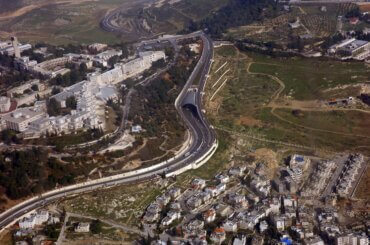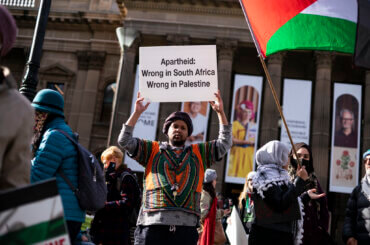How to document and render visible the most hidden space in the Israeli occupation?
Israel is making every effort to hide Palestinian prisons and other spaces of confinement. Much is made of the fact that Gaza is an open-air prison, but it is the life of the “security” prisoners that is most hidden. All branches of the Israeli authorities – the government, the secret service (the “Shabak,” or the Shin Bet), the Israeli prison service and the courts, all maintain the shroud of secrecy around the state’s security prisons and conceal conditions of interrogation and incarceration. Since cameras cannot enter, theater is the only medium that can provide a representation of the drama unfolding behind these barred cells.
This is the story of my attempt to stage such a drama with the play “Prisoners of the Occupation,” during a time when theater in Israel has become a cultural and political battleground.
In the Palestinian tragedy political prisoners are a taboo that Israeli society has yet to confront. Critical voices in Israel, even in the Israeli left, and even among those willing to acknowledge the Nakba (the mass-displacement, dispossession and dispersal of Palestinians following the establishment of Israel), have difficulty dealing with what Israel calls “security prisoners.” Security, of course, is a catchall phrase that hides massive differences under the arc of resistance: from those who posted political content on social media, such as Dareen Tatour who published a poem on her Facebook account; to politicians such as Dr. Bassel Ghattas and Khalida Jarrar; to activists who have been involved in nonviolent resistance such as Ahed Tamimi or Ahmad Katmash; to hundreds of administrative detainees, Palestinian imprisoned without charge only claims of intentions or thoughts; to people who were charged with participating in armed struggle against the occupation. Within the prison, it does not matter what you were imprisoned for- the harsh conditions equally applied and they violate conventions of prisoner rights.
For Israel and almost all Israelis, the political prisoner—no matter who she or he is—is a terrorist, a person for whom there is no sympathy and certainly no solidarity. Because the Israeli military and police increasingly use a take-no-prisoners approach to lethal force during clashes, Palestinians who are jailed for participating in confrontations are in fact survivors. Yet if they are not killed, they must disappear. They are not to be heard or seen.
I wanted to use the tools I know, the medium of theater, to offer a glimpse of the hidden space of these prison and stage a play about these political prisoners. However, when that which is repressed penetrates consciousness, the system spins into vertigo and it is impossible to know where the blow will land.

So what happens in Israel when you try to breach this taboo?
The documentary play “Prisoners of the Occupation,” is about the conditions of incarcerated political prisoners, which was supposed to take place at the last Acre Festival but was disqualified, condemned and removed from the stage for political reasons. The mayor of Acre insisted that the play must be banned “in order not to harm the delicate fabric between Jews and Arabs in the mixed city.” Minister of Culture Miri Regev attacked me personally, accusing me of “glorifying terrorists with blood on their hands.” Other festival participants withdrew their plays in protest of the boycott causing a heated public debate. This was followed by wild incitement that has hurt my family and undermined my livelihood and sense of security – I endured hate messages on social media, as well as threats and slander in the press. My work places received letters urging them to stop employing me, and even my little daughters suffered from bullying at school. The attacks I experienced are a small echo of a larger process of degeneration that has been unfolding in Israel: whereas in the past the struggle was about resisting the occupation and the apartheid it entails, nowadays the space for resistance is rapidly closing and it is necessary to struggle for the right just to speak out against the occupation; when once we were fighting against the occupation and the multiple violations it entails, we are now engaged in a battle over representation and must fight to even say that these problems exist.
Having ventured into forbidden areas and provoked the ire of Israel’s political establishment, including who they depend on for funding— the minister of culture—Israeli theaters now avoid working with me. This has unexpectedly proven a blessing for me as an artist and political activist. It allows me to explore and benefit creatively from work with Palestinian communities, not only as a form of expression but also as a political action. Every play I work on now brings with it long and deep relationships with communities of survivors, with the victims. We learn together, we read together and form relationships that endure well beyond and after the play has come and gone. The play is our learning process. It forms a site of resistance, and establishes the infrastructure for future life in the area.
The play “Prisoners of the Occupation” has become a joint work created with several former prisoners who wrote and reconstructed prison scenes. At a certain point prisoners who are still incarcerated began sending in scenes for the play, creating an unprecedented political and artistic community of people who I would otherwise never have met, let alone collaborated.
Those of us outside, especially the privileged among us, must work to forestall the effort to hide the political prisoners and I intend to do whatever I can to give them a voice.
The good news is that there is support from theaters internationally and from individuals and small sponsors. Together we will put the prisoners on stage, in the spotlight. If you too would like to help, please do so here.



Good work!
As you say, prisoners voices are the hardest to hear.
Miri Regev has all the charm, finesse and communication stylings of Roland Freisler.
They are scared to death of facts. They crush all attempts to bring their crimes into the daylight. It will not end well.
“and must fight to even say that these problems exist”
you remember those lovely lines in Journey to Ixtlan the path of knowledge is only traversed by balancing the terror with the wonder,
as don Genaro says “I left. And the birds stayed, singing”
there never was any way back to Ixtlan anyway, all you lose are illusions but what is not illusory will never leave you, not for one instant.
Great work – will spread the word – stay strong and thank you so much for your bravery and compassion.
Great work indeed but every news item in the last several years shows that staying in the hellhole and producing anything there is a waste of time and effort. Producing such a play here or in Europe may be difficult as we all know, but at least it could have an effect and help inform the general population.